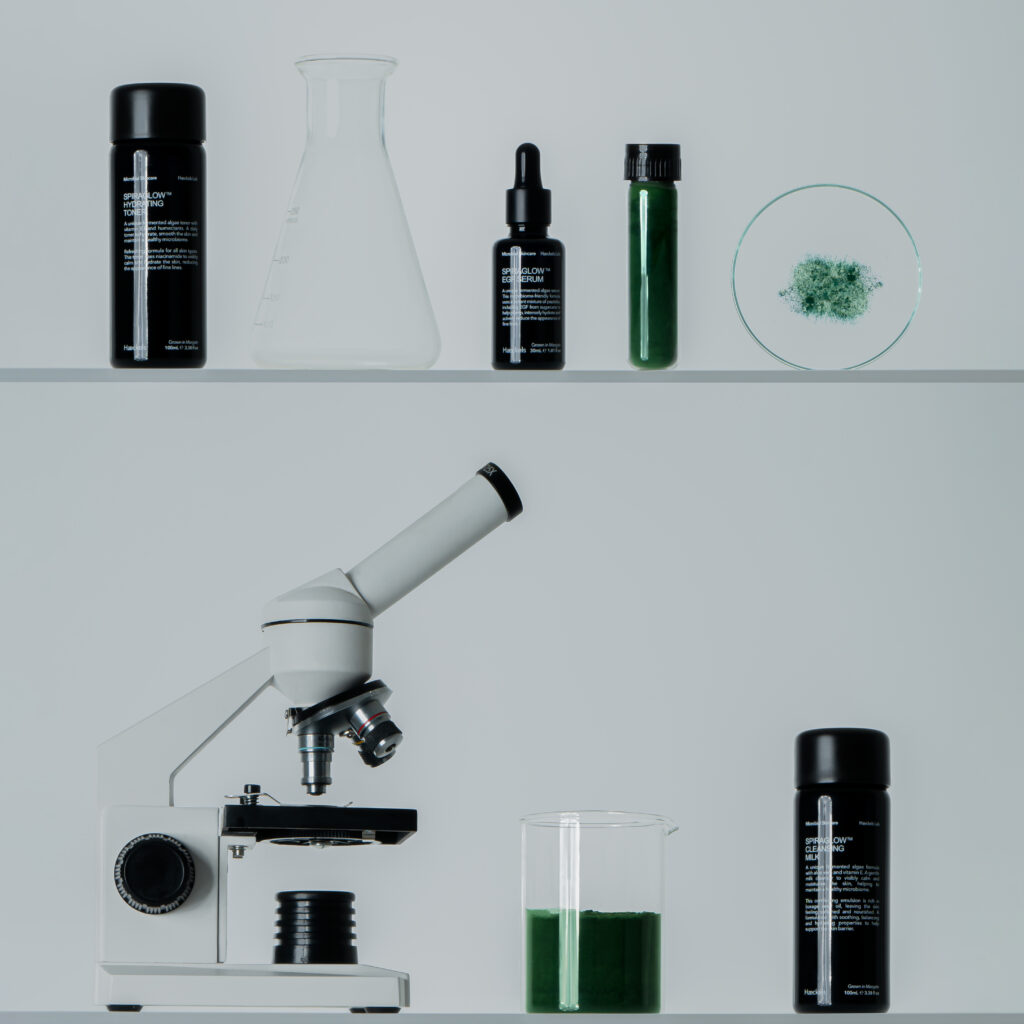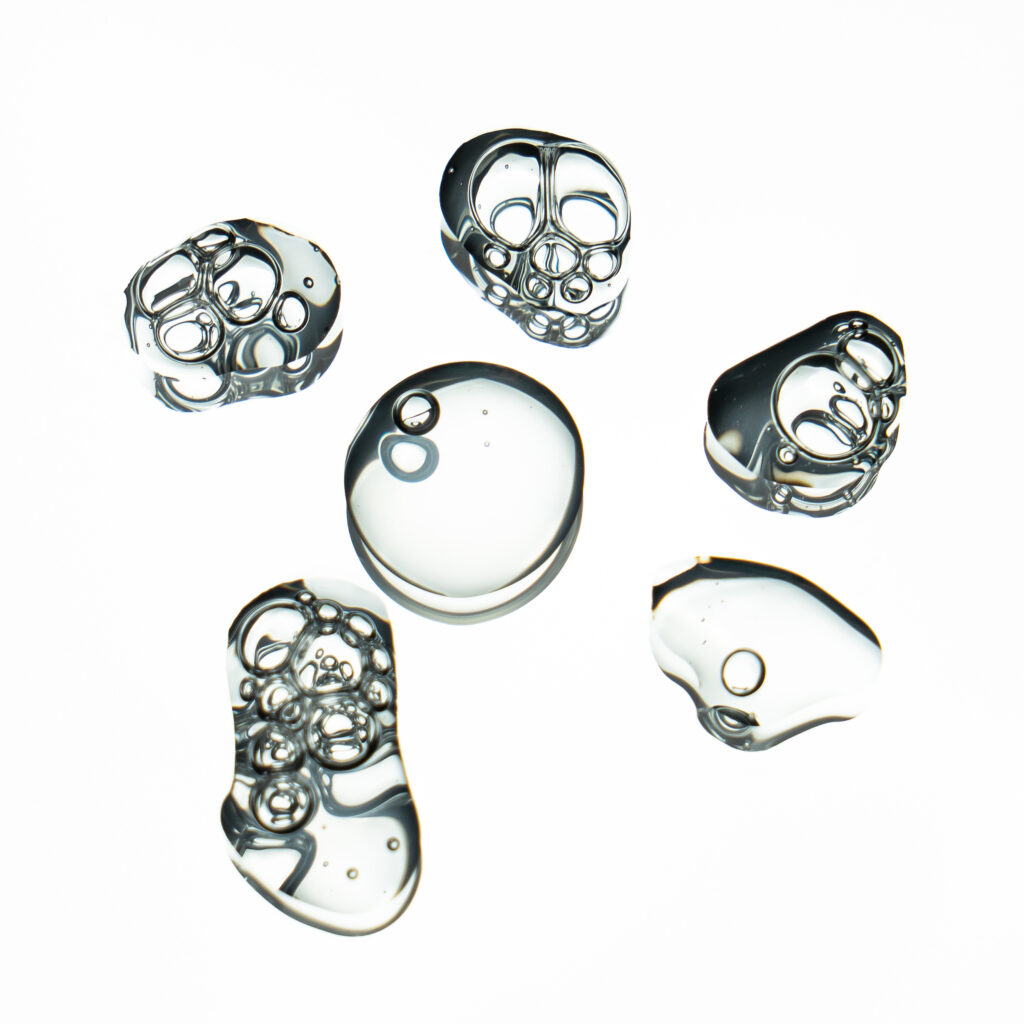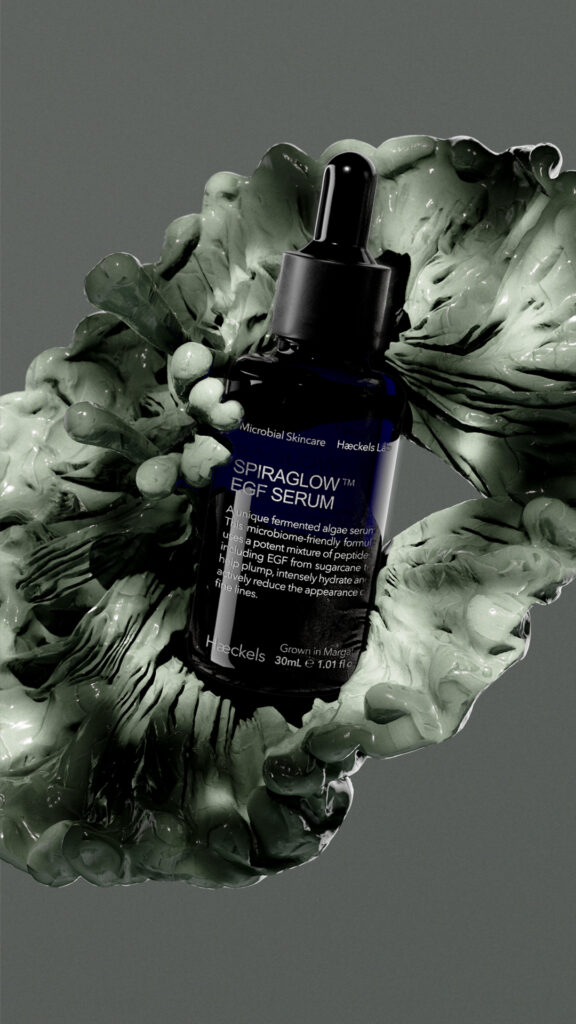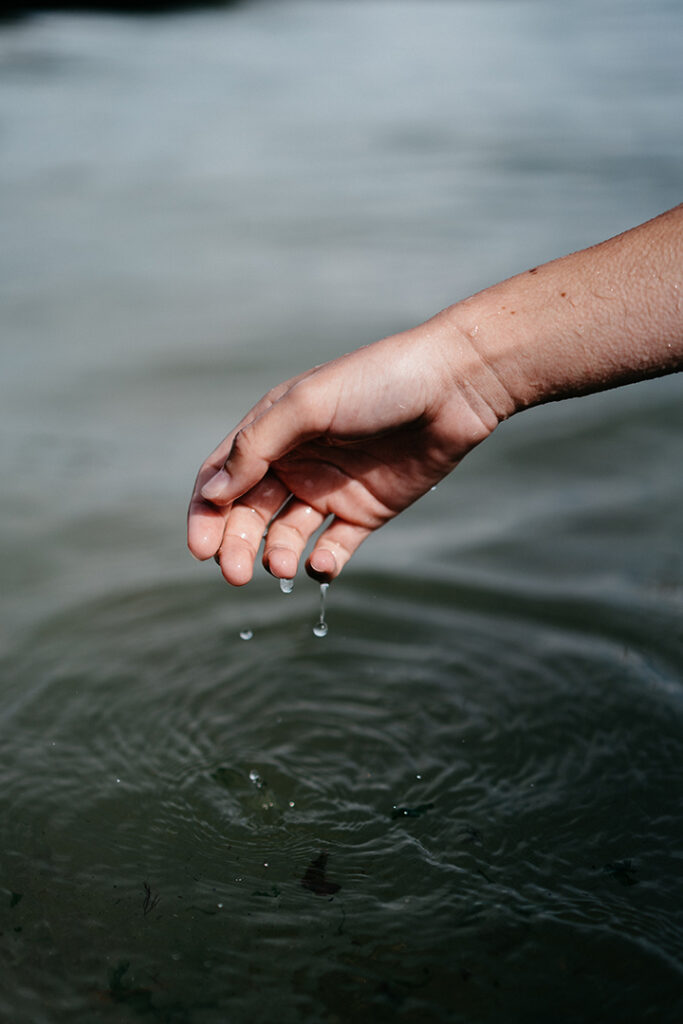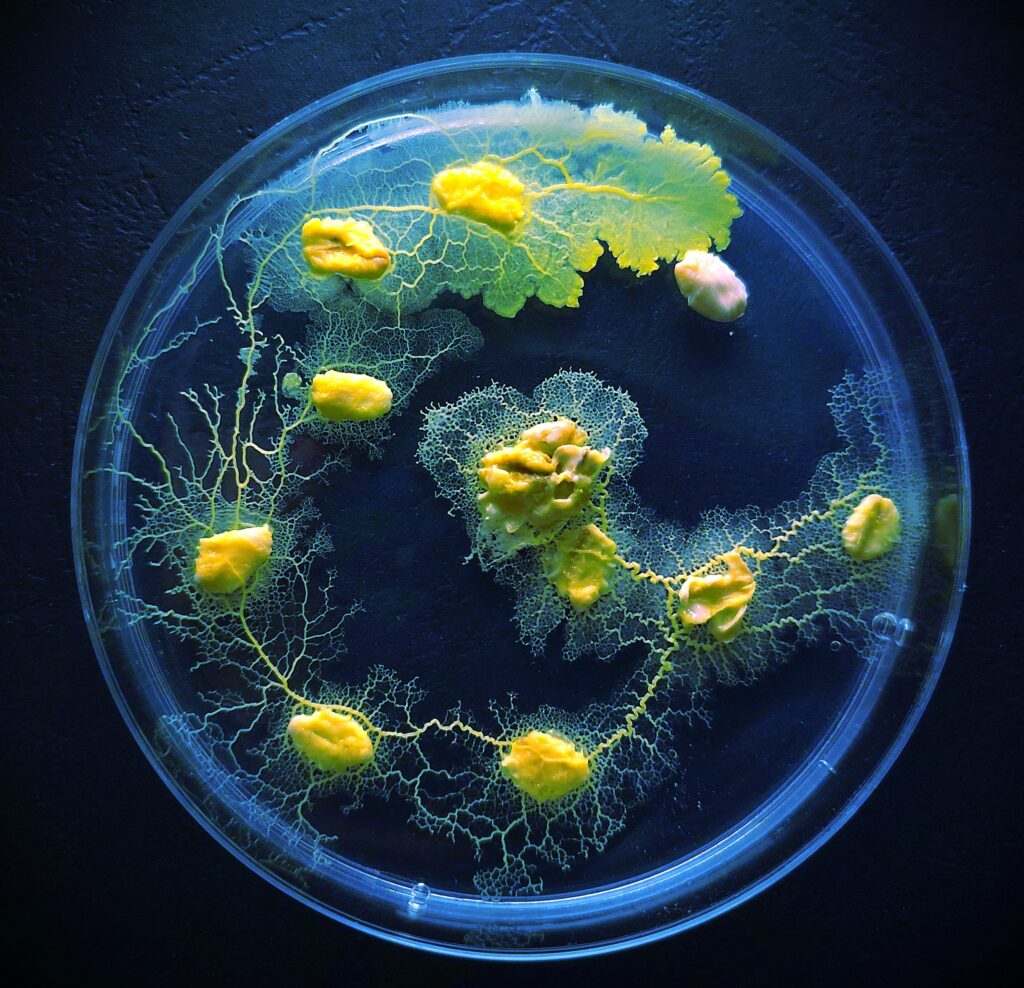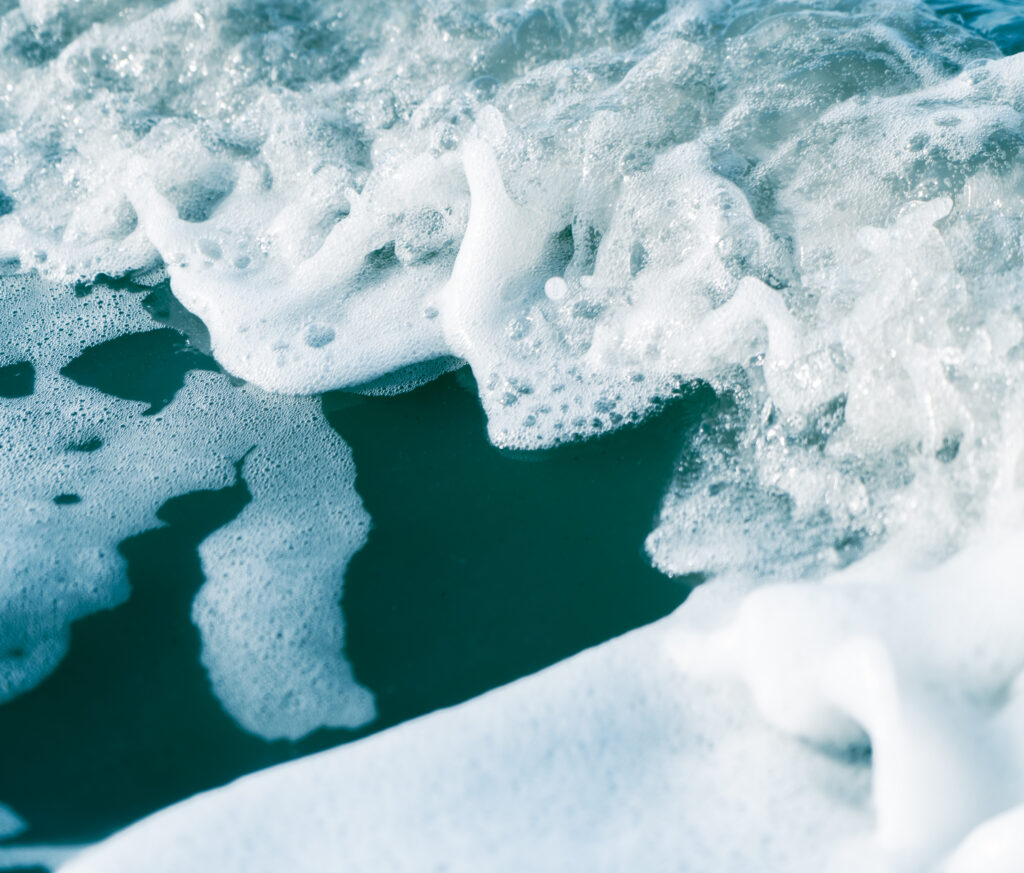
Beauty beyond
the tides:
Dom Bridges, Founder of Haeckels in conversation with Natsai Audrey Chieza.
Dom Bridges, the volunteer beach warden, coastal enthusiast and Founder of Haeckels–innovators of wild fragrance and ecological skincare–now lives in the Cornish countryside on a farm growing organic vegetables that just happen to be the by-products of Haeckels’ waste.
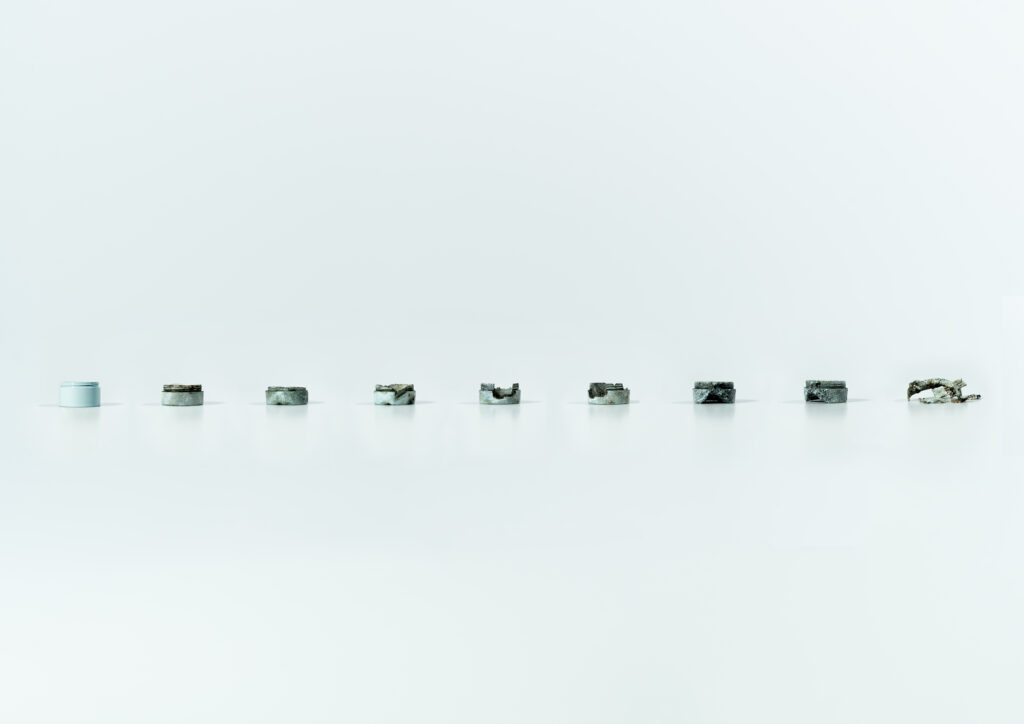
'Me and the kids have been eating Haeckels' packaging for a year and a half now. They seem to be alright.'
MUCKING AROUND FOR THE WISH OF A BETTER WORLD
Haeckels is a brand rooted in innovation, a kind of innovation that doesn’t commonly live in our imaginations as place-based. Haeckels develop skincare formulations–from hydrating serums and masks, to location-specific olfactory fragrances and treatments composed by the ocean. Early adopters of bio-based processes, the brand continues to work with locally hand-harvested seaweed while introducing bio-enabled ingredients grown-to-order in their Margate Lab. It’s rare to find brands that are able to synergise performance-led product innovation with a deep sense of responsibility to their local supply chains and communities. For Haeckels, Margate is muse.
When I moved there, it was economically fragile. There was one fisherman, the joke shop, an undertakers, a fish and chip shop, a couple of pubs and restaurants. I asked myself: What could one do that doesn’t exacerbate such a flimsy economy but can build on it and help it flourish? What is a better way to advertise this place, because I was falling in love with it. As everyone does. It’s to shout about how great the ocean is and help to amplify the place that way. And then maybe even better—produce something that could be taken away, cherished, and passed around the globe. I remember someone coming into the shop saying, ”We all really like and support what you’re doing, Dom, because it’s really obvious that you’re making it up as you go along.” It took me about ten years to figure out that this is what we do—we play.
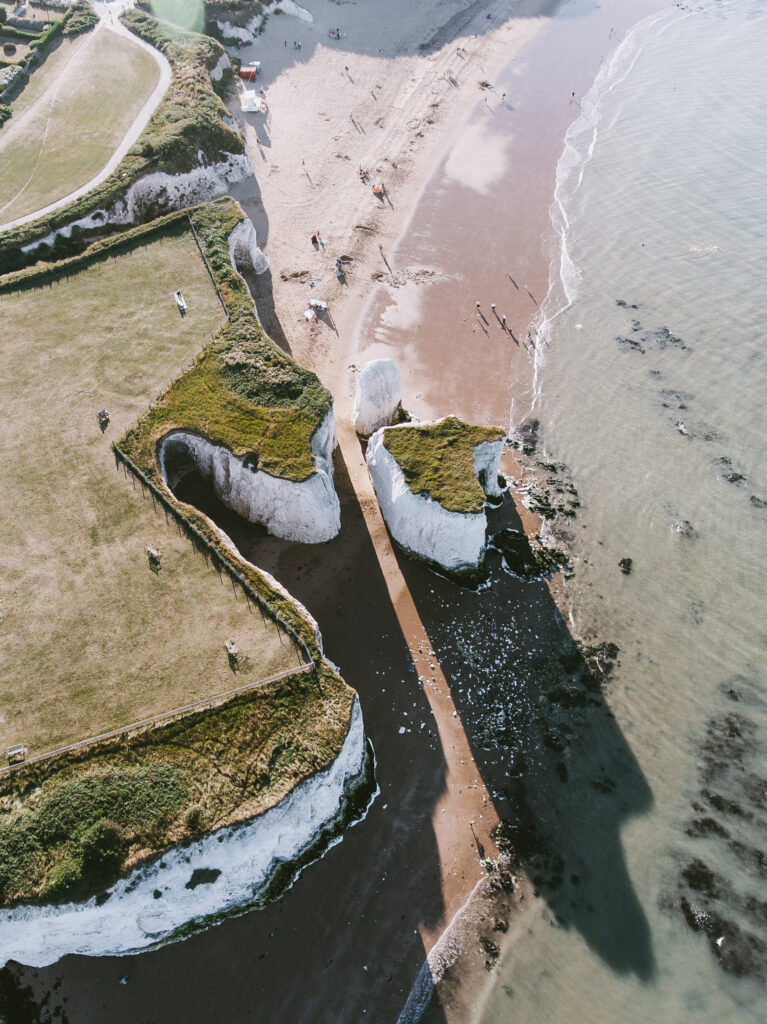
‘It took me about 10 years to figure out that this is what we do—we play.’
To truly understand the value of such an integrated approach, you’ve got to create it, regardless of its initial capacity to scale. You have to build those networks, capacities, and relations. Your innovation stack has never really followed a business-as-usual approach. Notably, you were early to hire and make space for biodesigners among your team to steer this kind of open-ended experimentation, and crucially, you weren’t afraid to build openly in public. This seems to me to be a very powerful and consequential form of play.
I had to really fight for it at the time. The investors didn’t see the logic of it. For example, they wanted another social media marketing person, and I said, “Well, no. We need a person who can make plastic bags out of carrots.” We have this abundance of raw material to play with, and that’s what gives us the ability to muck around for the wish of a better world.
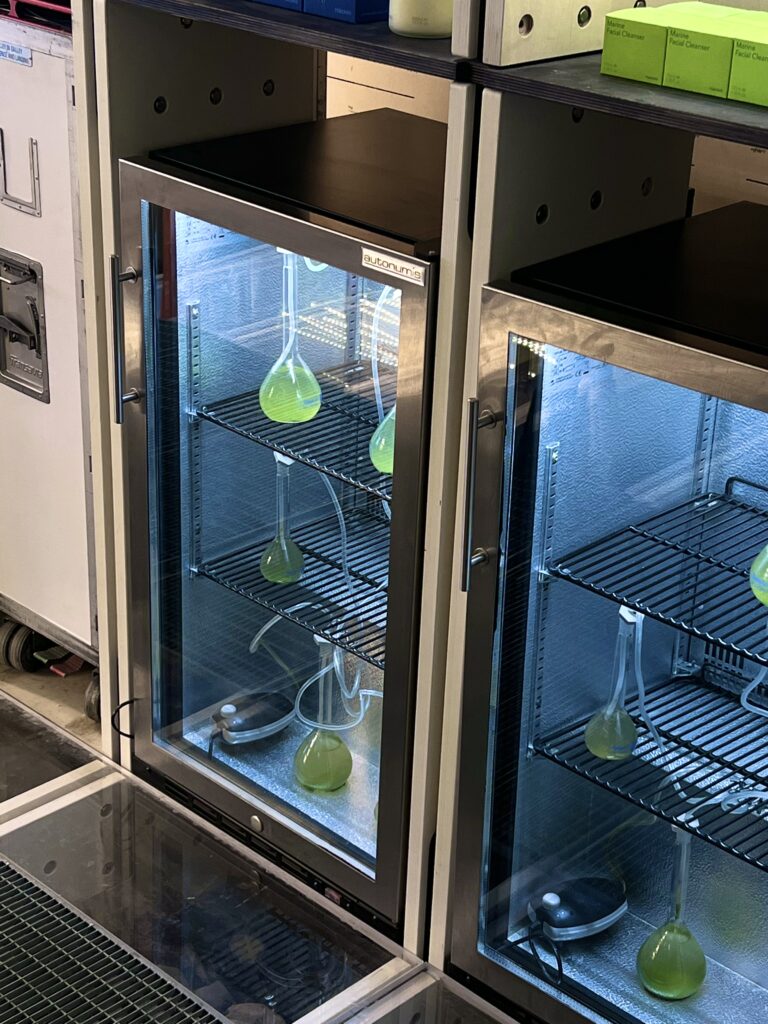
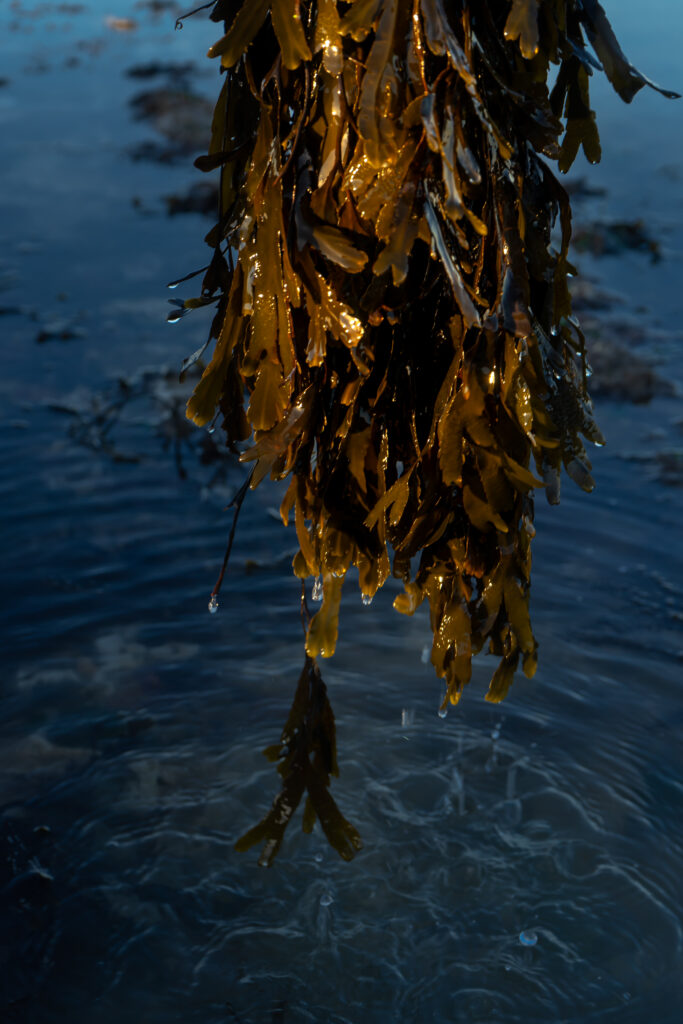
‘We have this abundance of raw material to play with, and that's what gives us the ability to muck around for the wish of a better world.’
RECONFIGURING WHAT IT MEANS TO GROW
Your approach to scaling this commitment to people and planet has been bioregional: taking into consideration the state of the land, the resources, the community, and how all of those things connect. Can you tell me more about how you think about scale?
On one hand, we have what we affectionately call a ‘making space’ on the coast, where products are made purely for online distribution, and on the other, a series of localised, self-sufficient stores—the kind of ‘pizzerias of skincare.’ It’s a direct analogy to Chinese canteen kitchens. We are bringing back the culture of made-on-the-spot ingredients and products, and building a different system where people can interface with goods more regularly. It’s about high ranking on basic things that we need as human beings; putting skincare on that kind of agenda rather than an adornment of lights and bright stores.
The key to unlocking all of this is that fundamentally, you develop products people love and enjoy using, which gives you the scope to experiment with new models for what a ‘good life’ looks like and how all notions of beauty are part of that story. What has prompted you to prioritise lab-grown ingredients as part of honouring Haeckels’ inherent ‘ocean-first’ philosophy?
The Spiraglow™ line, made with biofabricated algae, comes from the capacity to produce in-store. We were growing spirulina at Broadway Market in London when we first opened, from the viewpoint that we would make cookies that you could just stick in the bag on the go. Spiraglow is as much about protecting natural resources as it is about not even having to use them. It makes sense not to harvest seaweed in abundance across the world and instead experiment with alternative skincare ingredients. Though I wouldn’t necessarily say it is reasonable to start growing food out of nothing in a warehouse in central Manhattan either. It’s all too precious and beautiful to suggest that everything can be made in a factory without taking cultural and social welfare into account. We have to keep exploring in parallel, drawing references from both sides without demonising and alienating rural and indigenous communities.
‘It makes sense not to harvest seaweed in abundance across the world and instead experiment with alternative skincare ingredients. Though I wouldn't necessarily say it is reasonable to start growing food out of nothing in a warehouse in central Manhattan either.’
A TIDAL SHIFT
Looking at the new wave of biotech-enabled beauty brands, there is a tangible reset around messaging, product claims, and even product range. Emerging brands are confidently making the case for biotechnology to the consumer, emphasising the social, environmental, and performance benefits, and leaning into certification as a proof of work and a way to stand out in a saturated beauty market. You’ve been doing the deep work for a long time. What’s driving market innovation for the beauty industry?
It’s gone through loads of different changes. From snake oil to offering the same thing in 5 different sizes to just changing the fragrance, to someone like Brandon [Truaxe], the founder of Deciem, just charging you the price for the chemical. Definitely a massive hero of mine and, undoubtedly, one of the most disruptive people who has ever come into skincare. Our product line will shift dramatically in the next couple of months. Do we need all that stuff? No, we definitely don’t. We need something really concise that works and we’re constantly honing that down. Endless products, huge skus: all of that stuff is coming to an end. Younger generations are interested in far more celebratory, individual products that do very specific things. At Haeckels, over the next year our offering will become far more consolidated through what we’ve learned as a company and as we become better at formulating. So I feel we’re very different in that sense. There are incredibly ridiculously priced products out there that are no more effective or better than anything we’ve got on our shelves, no more effective or better than anything like the ordinary. Another driver of change is that there’s going to be a hell of a lot more regulation coming into the business—not dissimilar from the food industry—with far stricter rules on what you can and can’t say in terms of transparency in formulas. There’s the rise of B corp in the skincare space—a kind of badge of honour—which I’m into. I’m still processing how good that is—does it mean that ‘regenerative’ will need to have a stamp attached to it so you can make an official claim? At Haeckels, we work similarly to a factory from the 1940s or 1950s – absorbing, broadcasting, learning, and sharing as we go. It’s quite rare since most skincare brands are made up in a room and a PDF that gets invested in. And they know exactly how much they’re going to spend on acquiring customers. It affects how much they spend on the formulation before they’ve even made it. We are so traditional in that sense—making our own products and growing really slowly over what is now 10–11 years. As much as we’re doing some really interesting things and being disruptive, we’re incredibly old-fashioned.
Beyond ingredients, what other areas of innovation should the beauty industry be boldly tackling?
I’m obsessed with the concept of true circularity at the moment in its purest form, where people can buy something that’s of worth, valid and of use to them, and it does absolutely zero harm to the planet whatsoever. And that ‘something’ is made by craft makers, people who know how to make it better, and spend the time researching it. Rather than getting someone to endorse it or spend more money on forcing people to buy it. This becoming an industry standard is all I’m asking for.
IF ALL THAT WERE LEFT WERE A SHOP FOR LIQUIDS
What I’ve always found radical about Haeckels is your offer of products and community services, completely redefining the opportunities for the beauty industry to provide wellness in its expansive sense and beyond notions of the individual. You didn’t wait to have a charitable foundation to build a community sauna or steward local beach clean-up, and so I can’t imagine a Haeckels without the sauna.
I just genuinely like people. In some cultures, a sauna is something that you do with your whole family on a Sunday. They’re social spaces to hang out and look after yourself as part of everyday life. The only sauna in Margate had a £150 a month membership fee. Places like that can exclude people. Our public sauna, funded through a Kickstarter campaign, made everyone feel like anything was possible. If we want a sauna, we will bloody have one—and it’s going to be free!
Margate taught me the importance and value of community and how powerful a regular store can be, not dissimilar from the local fish and chips shop, that is truly connected to and supported by its community. If the public isn’t interested in what you’re doing, or if you aren’t entwined with it, then you’re not really going to last very long.
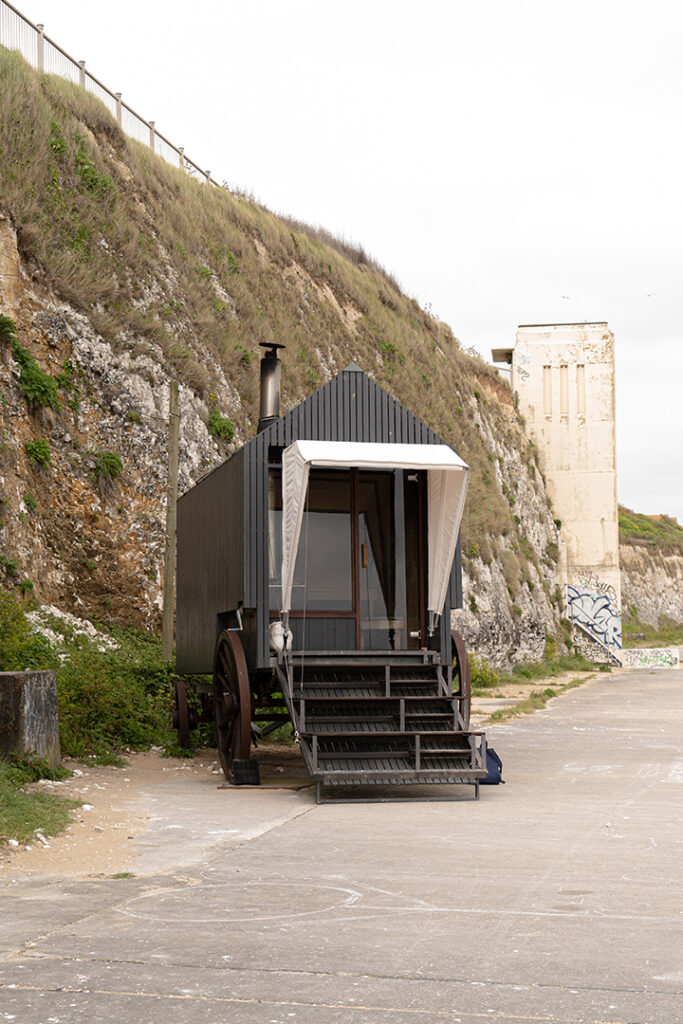
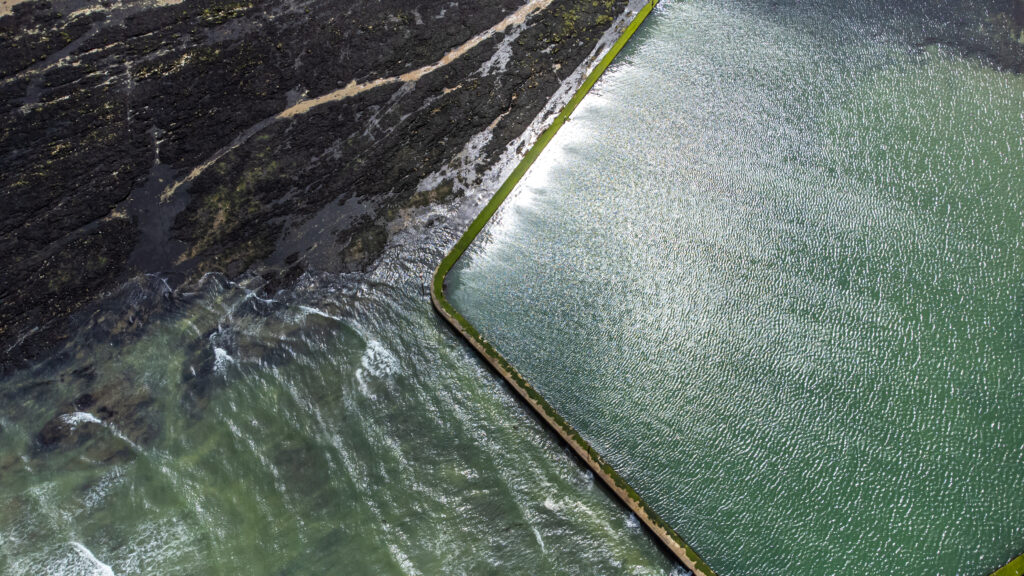
‘If the public isn't interested in what you're doing, or if you aren't entwined with it, then you're not really going to last very long.’
Traditional investors will ask “How do you make it pay?” Is this an ongoing tension that you experience?
That tension is real because it’s unquantifiable, right? How on earth do you measure that someone sat in the sauna, and how did this free thing actually come to be? How do you track those who came back? You can’t. And does it matter? I don’t think it does. All of these beautiful, unquantifiable things need to exist–to remain incalculable. They’re almost like payback. Some of our treatments could be deemed expensive, and I tend to feel a mild embarrassment that we have to take money from people at all. Then there is a free sauna that we made on the beach, which lowers your heart rate and gets you into the ocean.
As soon as you start to take away those founding elements, the whole thing starts to fall apart, and all that is left is just a shop for liquids.
‘As soon as you start to take away those founding elements, the whole thing starts to fall apart, and all that is left is just a shop for liquids.’
In this moment, what makes you optimistic?
Atop a tractor out on the Cornish farm, Dom gestures towards rows of edible greens sprouting from the earth.
I’m kind of hoping that these carrots that I’ve planted on my farm are going to grow. I’m really hoping that the ducks just over there are actually going to work out that all the slugs are under the planks, so they stop eating my plants. I think I’m lucky in that sense. I’m not waiting. I don’t think this sense of hope and wonder is somewhere else—and I see my kids getting like that as well, which makes me extremely happy.
We’re just playing. I’m just playing on the farm at the moment.
Shop the Haeckels’s Spiraglow EGF Serum.
